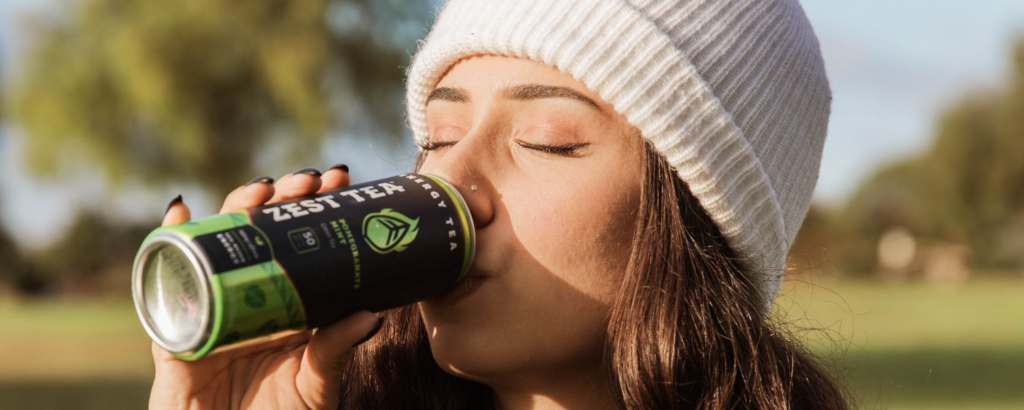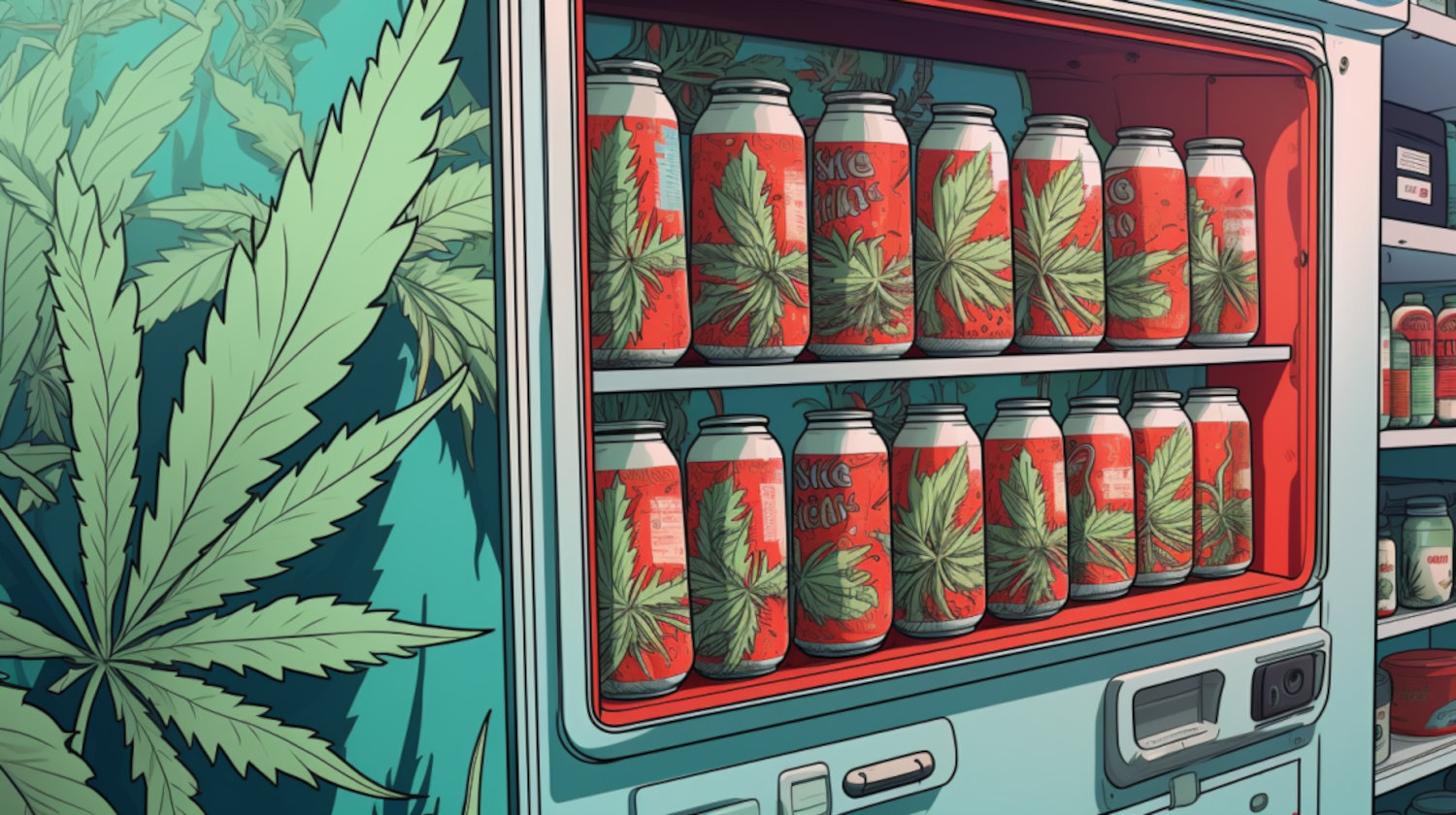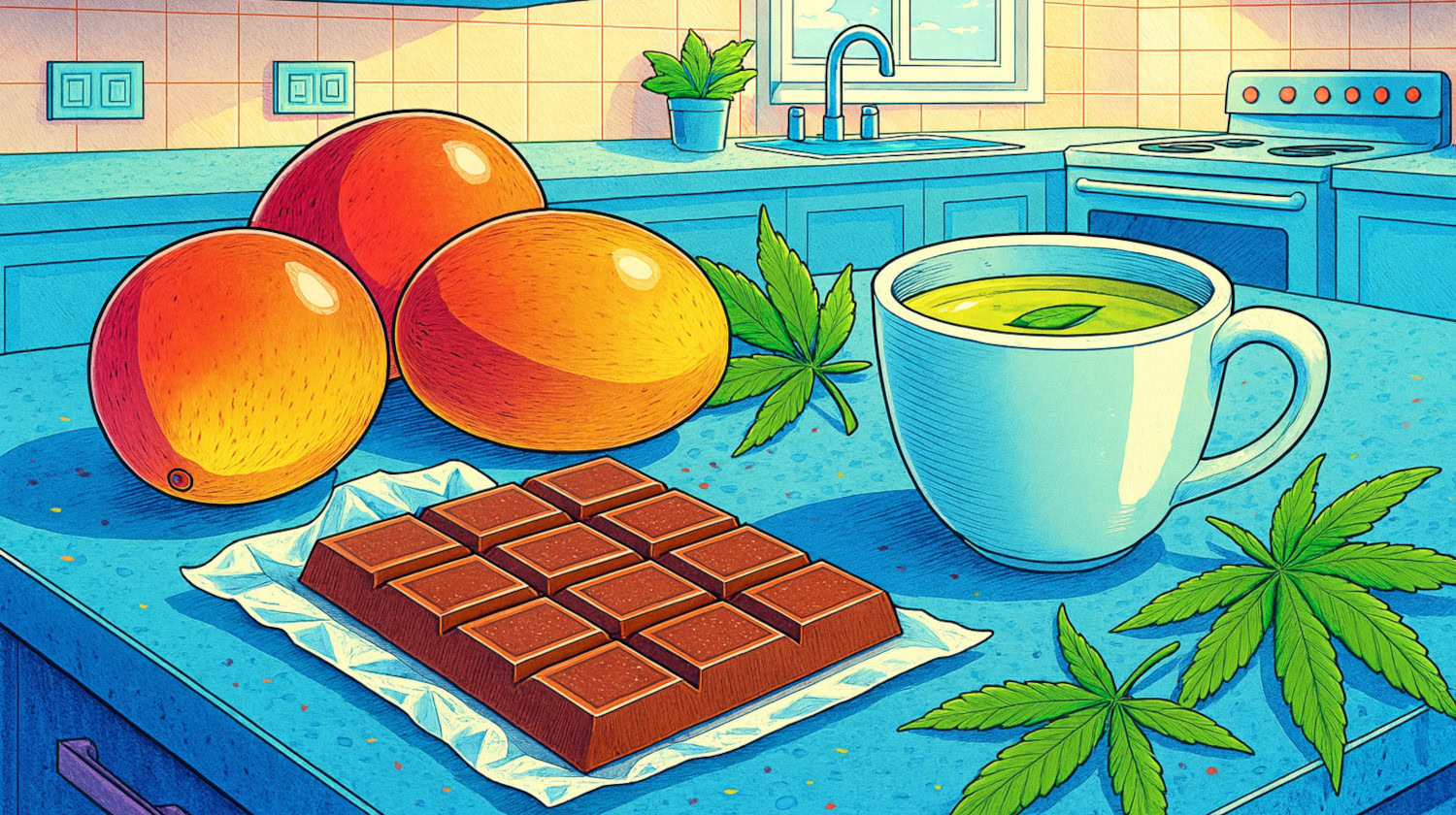People have been drinking coffee for thousands of years. Its popularity continues to grow, with new coffee shops and roasters popping up in cities worldwide.
The popularity of cannabis is also on the rise. With the legalization of marijuana in many states and countries, more and more people are exploring the benefits of this ancient plant.
But what happens when you mix these two cherished substances? Is it safe to consume caffeine and cannabis together? What are the potential benefits and risks?
In this article, we’ll explore the effects of consuming caffeine and cannabis at the same time. We’ll also look at caffeine alternatives for those looking to get an energy boost from cannabis alone.
So, sit back, grab a cup of joe (or a cannabis-infused beverage), and let’s dive in!
What is Caffeine?
If you’re a coffee drinker or a soda sipper, you’re likely already aware of caffeine. But what exactly is this chemical, and where does it come from?
Caffeine is a natural stimulant found in various plants' seeds, leaves, and fruits, such as coffee beans, tea leaves, and cacao pods. It can also be extracted from natural sources, like guarana berries and yerba mate leaves.
Caffeine belongs to a class of compounds called xanthines, which act as central nervous system stimulants.
When consumed, caffeine blocks the action of a neurotransmitter called adenosine, which typically slows down nerve cell activity and makes you feel sleepy. By blocking adenosine, caffeine increases neurotransmitter levels like dopamine and norepinephrine, boosting mood, energy, and focus.1
Here are some other effects that caffeine can have on the body:
- Increased alertness and wakefulness
- Improved mental performance and concentration
- Elevated mood and feelings of well-being
- Increased heart rate and blood pressure
- Reduced fatigue and drowsiness
While caffeine can have some positive effects, it’s not without its downsides. Here are some potential side effects of caffeine or consuming too much caffeine:
- Insomnia or disrupted sleep patterns
- Jitteriness, anxiety, or nervousness
- Headaches or migraines
- Upset stomach or digestive issues
- Rapid heart rate or palpitations
- Withdrawal symptoms if you stop consuming caffeine abruptly (like headaches, fatigue, and irritability)
The effects of caffeine can vary depending on the amount consumed, a user’s sensitivity to caffeine, and any other substances consumed alongside it (like weed, for example).
Caffeine and Weed Interaction

Some people may think combining caffeine with weed would naturally cancel each other out, but that’s not necessarily the case. Coffee and weed can interact in complex ways with both positive and negative effects on the body and mind.2,3
One of the most common effects of mixing caffeine and THC is a potentially amplified high. Caffeine is a stimulant, meaning it can increase heart rate, blood pressure, and metabolism. When combined with the intoxicating compounds in cannabis (like THC), caffeine can enhance the euphoric and energetic effects of the drug.
Many people report feeling more creative, social, and focused when they combine weed and coffee. Other consumers use caffeine to combat the lethargy and sleepiness that can accompany a cannabis high. And some users find that caffeine helps them maintain focus and productivity while using weed.
However, mixing caffeine and weed can also increase the risk of adverse side effects.
For example, caffeine can cause anxiety, jitteriness, and restlessness, which the feelings of paranoia and anxiety may exacerbate some people experience when they use cannabis.4
Not only that, but caffeine and weed both have diuretic effects, which can lead to dehydration if not adequately hydrated.5,6
It’s important to note that research on the effects of combining caffeine and cannabis is still relatively limited, and we need more studies to understand the potential risks and benefits fully.
Does Mixing Caffeine and Weed Enhance the High?

One of the most common reasons people mix caffeine and weed is to enhance the high. But does it actually work?
According to some scientific studies, there may be some truth to the idea that caffeine can enhance the effects of cannabis.
For example, a 2017 study found that consuming both caffeine and cannabis leads to an elevation in dopamine levels in animal test subjects. When combined, this surge in dopamine is amplified, leading to a sense of euphoria distinct from consuming these substances individually.7
While some research suggests that caffeine may enhance the effects of cannabis, it’s important to note that the science is still limited. More studies are needed to understand the mechanisms behind this phenomenon fully. Also, remember that individual responses to caffeine and cannabis can vary widely depending on dose, frequency of use, and tolerance levels.
If you want to get more out of your cannabis by combining it with caffeine, you should be aware of the potential risks. While effects will vary from person to person, mixing the two can lead to increased anxiety, jitteriness, and dehydration, among other adverse effects. Combining caffeine and cannabis can also lead to impaired driving and other safety risks. This is especially true if you’re not used to the effects of both substances.
Coffee and Weed: Is it Safe to Take Them at the Same Time?

After exploring the effects of caffeine and cannabis and how they interact, the big question remains: is it safe to take them at the same time? The answer is a bit complicated, as it depends on various factors. And a dose that might be overwhelming for one consumer may be too small for another.
One of the primary downsides of combining caffeine and weed is an increased risk of adverse side effects like anxiety, jitters, and dehydration. This is because both caffeine and cannabis can have stimulant effects on the body, which can be amplified when taken together.8,9
Combining coffee and cannabis may also lead to impaired driving and other safety risks, especially if you’re not used to the effects of both substances.
When it comes to dosage and frequency, there is no generally recommended limit for caffeine or THC when combining both substances. However, 400 milligrams (mg) of caffeine or less per day is typically considered the recommended limit. Similarly, the recommended limit for THC is no more than 40 mg per day, though this can vary greatly depending on the consumer and their reasons for using cannabis.
Because caffeine has shown some potential to enhance the effects of cannabis, it’s critical to be mindful of your individual tolerance levels to avoid having too much. Start with small doses if new to either substance or a particular combination.
Overall, the science on the safety of combining caffeine and marijuana is still limited. So, it’s recommended to proceed with caution.
For individuals with pre-existing conditions like anxiety, panic disorder, or heart problems, it may be best to avoid combining caffeine and weed altogether. It’s always a good idea to consult your doctor before trying new substances or combinations, especially if you have any pre-existing health conditions.
What About CBD Infused Coffee?

CBD-infused coffee has become increasingly popular in recent years as many people seek to combine the energizing effects of caffeine with the potential health benefits of CBD.8 CBD-infused coffee, as you can imagine, is simply coffee infused with CBD oil or isolate.
The interaction between coffee and CBD can vary depending on the individual and the dosage. Some studies suggest that CBD may have a calming effect on the body, which could (in theory) help counteract the jitters and anxiety that can sometimes be associated with caffeine.10
There is limited research into the effects of CBD-infused coffee or the combination of coffee and CBD.
Some people report feeling more focused and alert after consuming CBD-infused coffee. Yet others have found the opposite. While some studies have suggested that CBD may have potential health benefits, such as reducing inflammation, relieving pain, and promoting relaxation, more research is needed to fully understand the interaction between coffee and CBD.
While CBD isn’t intoxicating like THC, it’s still a good idea to start with a low dose and be mindful of any potential side effects or interactions with other medications.
If you’re interested in trying coffee and CBD, choose a reliable brand that uses high-quality ingredients and has been independently tested for its strength and purity.
Caffeine Alternatives: Weed Strains that Provide an Energy Boost

While caffeine can be a helpful tool for staying alert and focused, it can lead to nervousness, anxiety, and other adverse side effects for many consumers.
And while cannabis-infused coffees and energy drinks may seem like a viable alternative to traditional caffeine sources, they still contain caffeine.
Fortunately, for those looking for an alternative, several cannabis strains are known for their energizing effects.
Here are a few examples:
- Green Crack: This cultivar is known for its potent and long-lasting effects. It’s high in THC and the terpenes limonene and myrcene, which are believed to promote energy and focus.
- Durban Poison: Another popular landrace cultivar, Durban Poison, is known for its uplifting and cerebral effects. It’s high in THC and terpenes like terpinolene and beta-caryophyllene, which may contribute to its energizing properties.
- Jack Herer: Named after the famous cannabis activist, Jack Herer is a cultivar prized for its stimulating effects. It’s high in THC and terpenes like pinene and terpinolene, which are thought to promote mental clarity and focus.
- Super Lemon Haze: This cultivar is a cross between Haze, Skunk #1, and Northern Lights #5 and is known for its uplifting and energizing effects. It’s high in THC and terpenes like limonene and beta-caryophyllene, which may contribute to its mood-boosting properties.
- Harlequin: While not typically known for its energizing effects, Harlequin is a high-CBD cultivar prized for its ability to promote focus and mental clarity without the intoxicating effects of THC. It’s often used by people looking for a non-intoxicating alternative to caffeine.
While limited scientific research exists on the specific effects of these strains, many consumers report feeling more focused, alert, and energized after consuming them.
If you’re looking for a caffeine alternative, it’s worth exploring these and other strains to find the one that works best.
Start with a low dose and be mindful of potential side effects or interactions with other medications.
Conclusion
The effects of consuming caffeine and cannabis together can vary widely depending on the consumer. While some may find that combining the two provides a unique and enjoyable experience, others may experience unwanted side effects.
It’s essential to be mindful of your own body and tolerance levels when experimenting with caffeine and cannabis together. Start with a low dose and note how you feel before having a larger dose the next time. If you’re considering using cannabis for medical purposes, consult with a healthcare professional to determine if it’s right for you. If you live in a state where medical marijuana is legal, obtaining a medical marijuana card can be a crucial step in accessing the benefits of cannabis, including qualified support from a healthcare professional, safely and legally.
References
- Nehlig A, Daval JL, Debry G. Caffeine and the central nervous system: mechanisms of action, biochemical, metabolic and psychostimulant effects. Brain Res Brain Res Rev. 1992;17(2):139-170. doi:10.1016/0165-0173(92)90012-b ↩︎
- Owolabi JO, Olatunji SY, Olanrewaju AJ. Caffeine and Cannabis Effects on Vital Neurotransmitters and Enzymes in the Brain Tissue of Juvenile Experimental Rats. Annals of Neurosciences. 2017;24(2):65-73. doi:https://doi.org/10.1159/000475895 ↩︎
- Sousa VC, Ribeiro JA, Sebastião AM. Caffeine and Adenosine Receptor Modulation of Cannabinoid Influence Upon Cognitive Function. Journal of Caffeine Research. 2013;3(2):85-95. doi:https://doi.org/10.1089/jcr.2013.0010 ↩︎
- Richards G, Smith A. Caffeine consumption and self-assessed stress, anxiety, and depression in secondary school children. Journal of Psychopharmacology. 2015;29(12):1236-1247. doi:https://doi.org/10.1177/0269881115612404 ↩︎
- Maughan RJ, Griffin J. Caffeine ingestion and fluid balance: a review. Journal of Human Nutrition and Dietetics. 2003;16(6):411-420. doi:https://doi.org/10.1046/j.1365-277x.2003.00477.x ↩︎
- Paronis CA, Thakur GA, Bajaj S, et al. Diuretic Effects of Cannabinoids. Journal of Pharmacology and Experimental Therapeutics. 2012;344(1):8-14. doi:https://doi.org/10.1124/jpet.112.199331 ↩︎
- Klevebrant L, Frick A. Effects of caffeine on anxiety and panic attacks in patients with panic disorder: A systematic review and meta-analysis. General Hospital Psychiatry. 2022;74:22-31. doi:https://doi.org/10.1016/j.genhosppsych.2021.11.005 ↩︎
- Rapin L, Gamaoun R, El Hage C, Arboleda MF, Prosk E. Cannabidiol use and effectiveness: real-world evidence from a Canadian medical cannabis clinic. Journal of Cannabis Research. 2021;3(1). doi:https://doi.org/10.1186/s42238-021-00078-w ↩︎
- Shannon S. Cannabidiol in Anxiety and Sleep: A Large Case Series. The Permanente Journal. 2019;23. doi:https://doi.org/10.7812/tpp/18-041 ↩︎
- Sharpe L, Sinclair J, Kramer A, de Manincor M, Sarris J. Cannabis, a cause for anxiety? A critical appraisal of the anxiogenic and anxiolytic properties. Journal of Translational Medicine. 2020;18(1). doi:https://doi.org/10.1186/s12967-020-02518-2 ↩︎
The information in this article and any included images or charts are for educational purposes only. This information is neither a substitute for, nor does it replace, professional legal advice or medical advice, diagnosis, or treatment. If you have any concerns or questions about laws, regulations, or your health, you should always consult with an attorney, physician or other licensed professional.




